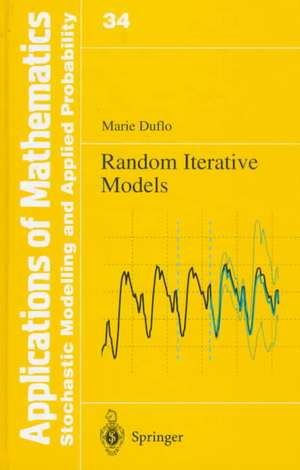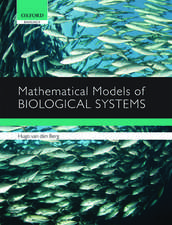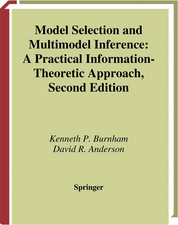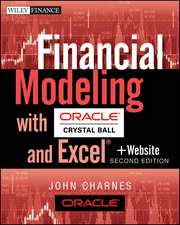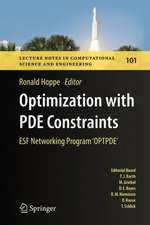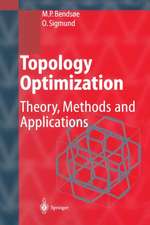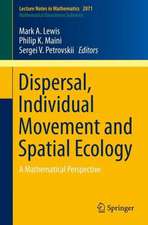Random Iterative Models: Stochastic Modelling and Applied Probability, cartea 34
Traducere de S. S. Wilson Autor Marie Dufloen Limba Engleză Hardback – 15 dec 1996
| Toate formatele și edițiile | Preț | Express |
|---|---|---|
| Paperback (1) | 569.54 lei 38-44 zile | |
| Springer Berlin, Heidelberg – 5 dec 2010 | 569.54 lei 38-44 zile | |
| Hardback (1) | 581.39 lei 38-44 zile | |
| Springer Berlin, Heidelberg – 15 dec 1996 | 581.39 lei 38-44 zile |
Din seria Stochastic Modelling and Applied Probability
- 17%
 Preț: 464.60 lei
Preț: 464.60 lei - 18%
 Preț: 805.44 lei
Preț: 805.44 lei - 18%
 Preț: 1110.72 lei
Preț: 1110.72 lei - 18%
 Preț: 947.35 lei
Preț: 947.35 lei -
 Preț: 390.84 lei
Preț: 390.84 lei - 18%
 Preț: 952.40 lei
Preț: 952.40 lei - 15%
 Preț: 648.56 lei
Preț: 648.56 lei - 18%
 Preț: 951.91 lei
Preț: 951.91 lei - 15%
 Preț: 637.13 lei
Preț: 637.13 lei - 18%
 Preț: 793.63 lei
Preț: 793.63 lei -
 Preț: 391.02 lei
Preț: 391.02 lei -
 Preț: 401.42 lei
Preț: 401.42 lei - 15%
 Preț: 639.08 lei
Preț: 639.08 lei - 18%
 Preț: 733.33 lei
Preț: 733.33 lei - 18%
 Preț: 785.11 lei
Preț: 785.11 lei - 15%
 Preț: 593.42 lei
Preț: 593.42 lei - 18%
 Preț: 1114.96 lei
Preț: 1114.96 lei - 15%
 Preț: 643.16 lei
Preț: 643.16 lei -
 Preț: 390.63 lei
Preț: 390.63 lei - 15%
 Preț: 645.60 lei
Preț: 645.60 lei - 15%
 Preț: 641.71 lei
Preț: 641.71 lei - 18%
 Preț: 954.62 lei
Preț: 954.62 lei - 15%
 Preț: 645.14 lei
Preț: 645.14 lei - 18%
 Preț: 947.50 lei
Preț: 947.50 lei - 18%
 Preț: 804.96 lei
Preț: 804.96 lei - 15%
 Preț: 644.63 lei
Preț: 644.63 lei - 20%
 Preț: 469.59 lei
Preț: 469.59 lei
Preț: 581.39 lei
Preț vechi: 726.73 lei
-20% Nou
Puncte Express: 872
Preț estimativ în valută:
111.25€ • 116.48$ • 92.27£
111.25€ • 116.48$ • 92.27£
Carte tipărită la comandă
Livrare economică 05-11 aprilie
Preluare comenzi: 021 569.72.76
Specificații
ISBN-13: 9783540571001
ISBN-10: 3540571000
Pagini: 412
Dimensiuni: 155 x 235 x 28 mm
Greutate: 0.75 kg
Ediția:1997
Editura: Springer Berlin, Heidelberg
Colecția Springer
Seria Stochastic Modelling and Applied Probability
Locul publicării:Berlin, Heidelberg, Germany
ISBN-10: 3540571000
Pagini: 412
Dimensiuni: 155 x 235 x 28 mm
Greutate: 0.75 kg
Ediția:1997
Editura: Springer Berlin, Heidelberg
Colecția Springer
Seria Stochastic Modelling and Applied Probability
Locul publicării:Berlin, Heidelberg, Germany
Public țintă
ResearchDescriere
Be
they
random
or
non-random,
iterative
methods
have
progressively
gained
sway
with
the
development
of
computer
science
and
automatic
control
theory.
Thus,
being
easy
to
conceive
and
simulate,
stochastic
processes
defined
by
an
iterative
formula
(linear
or
functional)
have
been
the
subject
of
many
studies.
The
iterative
structure
often
leads
to
simpler
and
more
explicit
arguments
than
certain
classical
theories
of
processes.
On
the
other
hand,
when
it
comes
to
choosing
step-by-step
decision
algorithms
(sequential
statistics,
control,
learning,
...
)
recursive
decision
methods
are
indispensable.
They
lend
themselves
naturally
to
problems
of
the
identification
and
control
of
iterative
stochastic
processes.
In
recent
years,
know-how
in
this
area
has
advanced
greatly;
this
is
reflected
in
the
corresponding
theoretical
problems,
many
of
which
remain
open.
At
Whom
Is
This
Book
Aimed?
I
thought
it
useful
to
present
the
basic
ideas
and
tools
relating
to
random
iterative
models
in
a
form
accessible
to
a
mathematician
familiar
with
the
classical
concepts
of
probability
and
statistics
but
lacking
experience
in
automatic
control
theory.
Thus,
the
first
aim
of
this
book
is
to
show
young
research
workers
that
work
in
this
area
is
varied
and
interesting
and
to
facilitate
their
initiation
period.
The
second
aim
is
to
present
more
seasoned
probabilists
with
a
number
of
recent
original
techniques
and
arguments
relating
to
iterative
methods
in
a
fairly
classical
environment.
Cuprins
I.
Sources
of
Recursive
Methods.-
1.
Traditional
Problems.-
2.
Rate
of
Convergence.-
3.
Current
Problems.-
II.
Linear
Models.-
4.
Causality
and
Excitation.-
5.
Linear
Identification
and
Tracking.-
III.
Nonlinear
Models.-
6.
Stability.-
7.
Nonlinear
Identification
and
Control.-
IV.
Markov
Models.-
8.
Recurrence.-
9.
Learning.
Textul de pe ultima copertă
The
recent
development
of
computation
and
automation
has
lead
to
quick
advances
in
the
theory
and
practice
of
recursive
methods
for
stabilization,
identification
and
control
of
complex
stochastic
models
(guiding
a
rocket
or
a
plane,
orgainizing
multiaccess
broadcast
channels,
self-learning
of
neural
networks
...).
This
book
provides
a
wide-angle
view
of
those
methods:
stochastic
approximation,
linear
and
non-linear
models,
controlled
Markov
chains,
estimation
and
adaptive
control,
learning
...
Mathematicians
familiar
with
the
basics
of
Probability
and
Statistics
will
find
here
a
self-contained
account
of
many
approaches
to
those
theories,
some
of
them
classical,
some
of
them
leading
up
to
current
and
future
research.
Each
chapter
can
form
the
core
material
for
a
course
of
lectures.
Engineers
having
to
control
complex
systems
can
discover
new
algorithms
with
good
performances
and
reasonably
easy
computation.
